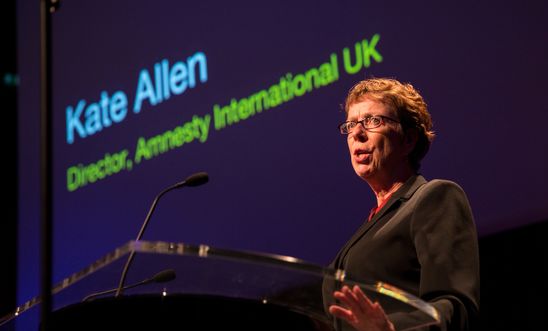
Press releases
Brexit bill set to 'substantially reduce rights in the UK', Amnesty annual report warns

The EU Withdrawal Bill is set to significantly reduce human rights protections in the UK, Amnesty International warned today, while a rush to sign new trade deals means there is a growing risk the UK will “soft-pedal” on human rights around the world.
The warning came as Amnesty published its annual assessment of human rights around the world, Amnesty International Report 2017/18: the state of the world’s human rights, a 409-page report covering 159 countries.
On the EU Withdrawal Bill, Amnesty’s report singles out the UK Government’s failure to retain the EU Charter of Fundamental Rights in domestic law, weakening the protections currently available to people in the UK. Similarly, the Brexit bill fails to retain people’s ability to bring a case founded on the EU “general principles”, which include protections such as the right to equality.
Meanwhile, Amnesty warned that the UK’s so-called “Global Britain” drive to secure new trade deals as the UK prepares to leave the European Union is leading to a heightened risk of the UK ministers and officials “soft-pedalling” on human rights issues even where countries have extremely poor human rights records.
Last month, China’s national newspaper The Global Times praised Prime Minister Theresa May for “resisting radical pressure at home” to raise concerns over the treatment of democracy protesters in Hong Kong in efforts to focus on trade and investment links with the world's second-largest economy. Meanwhile, recent UK trade delegations to Saudi Arabia, the Philippines and the USA have raised concerns over the UK’s apparent unwillingness to speak publicly about human rights overseas.
Kate Allen, Amnesty International UK’s Director, said:
“You don’t have to be pro- or anti-Brexit to see that without reform the EU Withdrawal Bill is set to substantially reduce rights in the UK.
“Under cover of Brexit, the Government is planning to strip the British public of protections - and people don’t even know their hard-won rights are under threat.
“We’re concerned the UK is using the UK’s withdrawal from the EU to justify a new ‘hard-nosed’ approach to trade which could mean soft-pedalling on human rights overseas.
“The UK needs to hold fast to the principles of fair trials, free speech and decent labour standards. We mustn’t trade away our values in our eagerness to sign new deals.”
Unprecedented scale of attacks on human rights activists
On a global level, Amnesty’s report was sharply critical of world leaders for promoting hate and division to further their own political ends. It also warned that in the 70th year since the Universal Declaration of Human Rights (1948), human rights protections are under serious global threat, with authoritarian leaders seeking to narrow or withdraw them.
Meanwhile, the report warned that activists and organisations working to promote and protect human rights came under attack at an unprecedented level last year. In the last year, hundreds of activists were killed as the authorities sought to silence campaigners and muzzle the media. The biggest jailors of journalists were Turkey, Egypt and China. China also detained the Nobel laureate Liu Xiaobo until shortly before his death in hospital after serving more than seven years in prison for criticising the government. Amnesty itself faced threats to its work in Hungary as well as the unprecedented arrests of its staff in Turkey, where the organisation’s ChairTaner Kılıç is currently jailed.
Salil Shetty, Amnesty International’s Secretary General, said:
“Governments are shamelessly turning the clock back on decades of hard-won protections.
“The transparently hateful move by the US government in January to ban entry to people from several Muslim-majority countries set the scene for a year in which leaders took the politics of hate to its most dangerous conclusion.
“We saw the ultimate consequence of a society encouraged to hate, scapegoat and fear minorities laid bare in the horrific military campaign of ethnic cleansing against the Rohingya people in Myanmar.
“The feeble response to crimes against humanity and war crimes from Myanmar to Iraq, South Sudan, Syria and Yemen underscored the lack of leadership on human rights.
“Governments think they can declare open season on human rights activists. They may shut down our newspapers, undermine judges and jail activists, but we refuse to be silenced.”